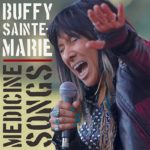“Medicine Songs” – Buffy Sainte-Marie

 ‘Buffy Sainte-Marie, wasn’t she one of those protest singers back in the black and white days?”
‘Buffy Sainte-Marie, wasn’t she one of those protest singers back in the black and white days?”
‘Yep.’
‘And she’s still around now?’
‘Yep.’
‘So what’s she protesting about now?’
‘Exactly the same things she was protesting about back then. Been lots of fine words spoken and written about indigenous peoples across the world but nothing’s changed. We’re still fighting wars, the environment’s still being exploited by the suits and it’s still acceptable to brush aside Native Americans, Aboriginal Australians and Inuit when there’s a profit to be made. Just look at Standing Rock. Guess Buffy Sainte-Marie’s still as relevant fifty years down the line.’
Buffy thinks so as well. “Medicine Songs” is an album for these times. Some of the songs are over fifty years old and there are only two completely new songs, but “Medicine Songs” is something very special. Buffy Sainte-Marie has taken the older songs, given them new treatments for the twenty-first century and, in her words, ‘put them to work’. It’s just possible that some of them are even more relevant now. The album’s thirteen songs long, but the digital edition (which you get as a download code with the vinyl or CD) has an additional seven songs, so you get twenty songs in total (including two very different versions of “The War Racket”). Where do I start? Well, I’m going to pick a few of my personal highpoints.
The two songs that open the album embody its two main themes. “You Got to Run”, featuring Tanya Tagaq, with a barrage of floor toms and Native American choral backing vocals, emphasises positivity and cooperation, while “The War Racket” denounces the obscenity of warmongers making huge profits from conflicts that they dress up as virtuous interventions. The protest songs make up the majority of the album, but there’s enough of a positive message with songs like “Carry It On” and “Starwalker” and “Soldier Blue” which celebrate indigenous American culture, and the gorgeous, poppy “Fallen Angels”, to add some contrast to the picture.
Of the earlier songs, “My Country ‘Tis of Thy People You’re Dying”, “Universal Soldier” and “Now That the Buffalo’s Gone” are given a sixties/seventies solo acoustic treatment, while “Generation” gets a mid-tempo rock production with a military drumbeat in the breakdown. “Bury My Heart at Wounded Knee” is transformed into a rock/reggae hybrid with a heavy emphasis on the off beat and a big distorted guitar sound to punctuate the lyrics while “No No Keshagesh” is a huge production with pumping bass, raw overdriven guitars, sampled backing vocals and a lead vocal echoed by synth lines. And, if you’re more at home out on the floor, “Power in the Blood” gets the four–to-the-floor treatment with a huge production built around thunderous bass and floor toms, while “Working for the Government” is a slightly more subtle “Professional Widow”-style reworking; both stylings refresh and reinvigorate the songs. Have a listen for yourself by clicking on any of the links.
If there was ever a time for these songs to be heard, it’s now. Many of them were pertinent at the time of release but considered too controversial for airplay; songs exposing corporate greed, militarism, historical revisionism and the problems still facing the indigenous population in Canada (it’s not specifically referenced on the album, but the CD booklet features a picture from the Red Dress Project). “Medicine Songs” is about as far as you can get from the vanilla choking the airwaves at the moment (that’s a recommendation in itself) and it comes when we most need it. 2018 is shaping up as the year of the protest singer; if it’s all this good, bring it on.
“Medicine Songs” is released on True North Records (TND681) on Friday January 26,2018.


